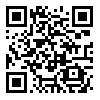مجله رویش روانشناسی از دادن گواهیهای کاغذی معذور است. لطفا تقاضا نکنید. همه گواهی ها در صفحه شخصی کاربران موجود است.
year 14, Issue 4 (sumer 2025 2025)
Rooyesh 2025, 14(4): 123-132 |
Back to browse issues page
Download citation:
BibTeX | RIS | EndNote | Medlars | ProCite | Reference Manager | RefWorks
Send citation to:



BibTeX | RIS | EndNote | Medlars | ProCite | Reference Manager | RefWorks
Send citation to:
Mostaed S, Khoshlahjeh Sedgh A. (2025). The effectiveness of transcranial electrical brain stimulation (TDCS) on emotion dysregulation and impulsivity in patients with bipolar disorder. Rooyesh. 14(4), 123-132.
URL: http://frooyesh.ir/article-1-5723-en.html
URL: http://frooyesh.ir/article-1-5723-en.html
1- Master of Clinical Psychology, Clinical Psychology Department, Medical Sciences Unit, Islamic Azad University, Qom, Iran.
2- Assistant Professor, Clinical Psychology Department, Medical Sciences Unit, Islamic Azad University, Qom, Iran. ,anisssedq@yahoo.com
2- Assistant Professor, Clinical Psychology Department, Medical Sciences Unit, Islamic Azad University, Qom, Iran. ,
Abstract: (589 Views)
This study aimed to determine the effectiveness of treatment based on transcranial brain stimulation on emotional dysregulation and impulsivity in patients with bipolar disorder. The research method was semi-experimental with a pre-test and post-test design with a control group. The statistical population of the research is made up of all people with a definite psychiatric and clinical diagnosis of bipolar who were referred to neurotherapy centers in Tehran in 2023. The number of available samples was estimated to be 60 people, and 30 people were randomly assigned to two experimental and control groups. Data collection tools included Barratt E.S., Stanford M.S., Kent T.A., Felthous A. (1994) Impulsivity Scale, Gratz, K. L., & Roemer's Emotion Dysregulation Scale (2004), and Transcranial Electrical Brain Stimulation in twelve sessions, and the duration of each session was 20 minutes over 30 days. For data analysis, multivariate covariance analysis was used with SPSS 25 software. The results showed that by controlling the effect of the pre-test, there was a significant difference between the post-test of the experimental group and the control in emotional dysregulation and impulsivity (p<0.05). It can be concluded that the treatment based on transcranial brain stimulation had an effect on emotional dysregulation and impulsivity in the experimental group.
Type of Article: Research |
Subject:
Clinical Psychology
Received: 2024/10/12 | Accepted: 2025/01/18 | ePublished: 2025/07/1
Received: 2024/10/12 | Accepted: 2025/01/18 | ePublished: 2025/07/1
Send email to the article author
| Rights and permissions | |
 |
This work is licensed under a Creative Commons Attribution-NonCommercial 4.0 International License. |





